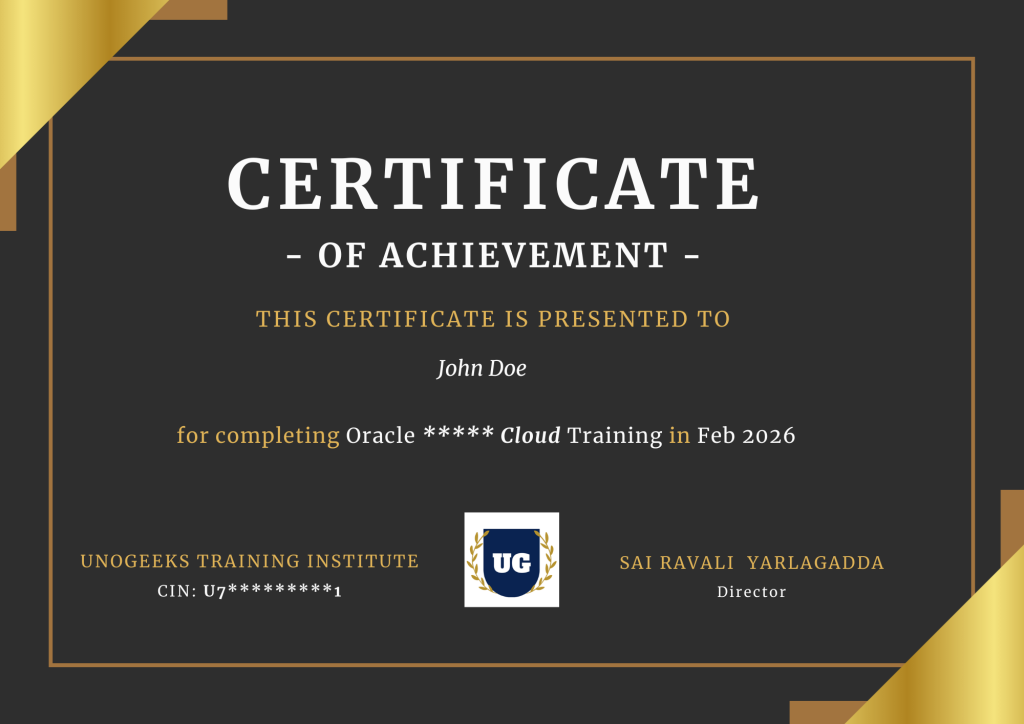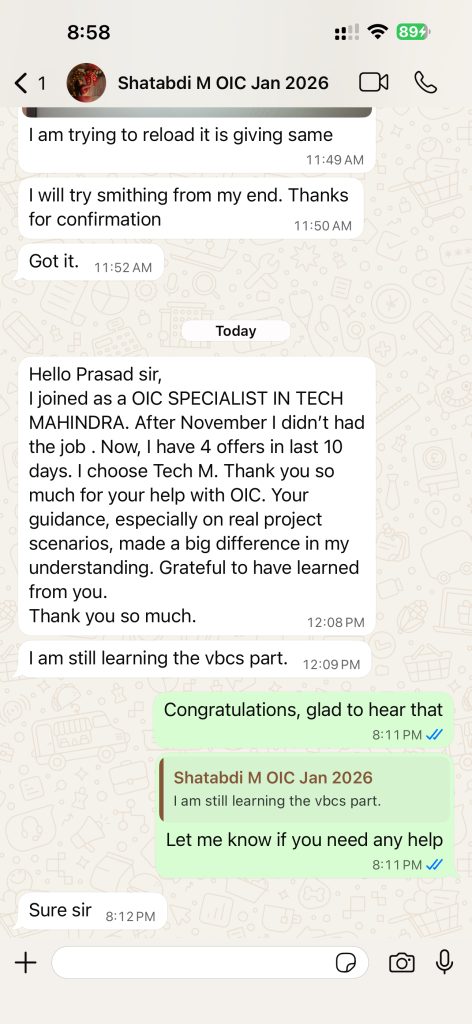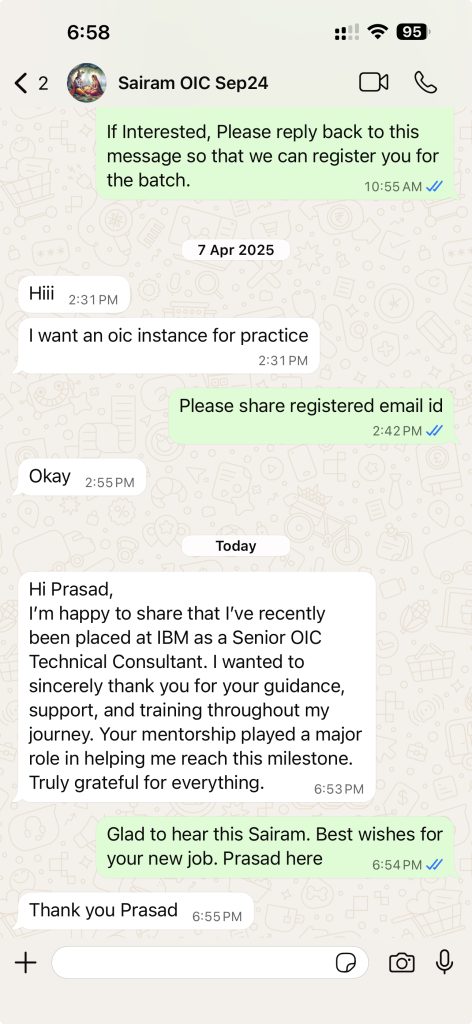Oracle Fusion HCM Online Training
Trusted by 20,000+ professionals across India, the US, and Middle East.
About Oracle Fusion HCM Online Training
At UnoGeeks, our Oracle Fusion HCM Online Training is built to make you project-ready and placement-focused from day one. With Oracle Cloud HCM Projects rapidly expanding across global enterprises, the demand for skilled Fusion HCM consultants is at an all-time high, and companies are hiring Functional and Technical professionals.
Oracle Fusion HCM professionals today command strong salary packages, with freshers securing competitive entry-level roles and experienced consultants earning high-paying positions in top consulting firms and MNCs. Our training goes beyond theory with real-time projects, interview preparation, and live scenario-based learning to make you fully job-ready.
By the end of the program, you won’t just understand Oracle Fusion HCM — you’ll be ready to crack interviews and step into real project roles with confidence.
Our Students Work At
For Quick Questions
Watch HCM 2026 Videos Playlist
Get Course Full Syllabus
Oracle Fusion HCM Online Training Course Details
About Oracle Fusion HCM Online Training
Oracle Fusion Cloud HCM is a powerful, cloud-native human capital management suite that brings together all core HR processes — from recruitment and talent management to workforce management, payroll, & compliance — on a single intelligent platform with embedded AI.
It enables organizations to manage the complete employee lifecycle efficiently, improve workforce productivity, and deliver an exceptional employee experience across modern, hybrid work environments.
Key Features & Capabilities
- Unified HCM Platform – Connects all HR processes and employee data using a single global data model
- AI-Driven Intelligence – Embedded AI and smart workflows to automate processes and improve decision-making
- End-to-End HCM Modules – Global HR, Talent Management, Workforce Management, Payroll & Compliance
- Global Compliance Ready – Supports payroll and statutory requirements across 60+ countries
- Enhanced Employee Experience – Personalized and engaging experiences that boost productivity
- Anywhere Access – Secure access across desktop, tablet, and mobile devices
Become a Certified Oracle Fusion HCM Consultant
Looking to build a high-paying career in Oracle Cloud HCM?
Join UnoGeeks’ Best Oracle Fusion HCM Online Training Program — trusted by hundreds of professionals and rated as one of the top Oracle HCM training institutes in the market.
We focus on real-time project training, certification guidance, and job-oriented skills — not just theory.
What You Will Learn
- Workforce Deployment modules – Global HR, Absence Management & Payroll
- Compensation Management setups – Base Pay, Compensation Plans & Total Compensation Statements (TCS)
- Talent Management modules – Goals, Profiles & Performance Management
- Hands-on configuration with real-time live project scenarios
- Complete HCM Technical skills – HDL/HSDL, BIP & OTBI reports, HCM Extracts, Fast Formulas, Approvals, Sandbox & VBS
- Oracle HCM certification guidance and exam preparation
- Resume building + mock interviews with personalized feedback
- Job readiness support with regular HCM job openings and referrals
🔔 Daily Oracle Job Alerts by UnoGeeks
Follow us on LinkedIn for real hiring updates: 👉 UnoGeeks HCM LinkedIn Jobs
Who Can Enrol in This Course?
- IT professionals looking to transition into Oracle Fusion HCM consulting
- Graduates & post-graduates aiming to start a career in Oracle Cloud
- Freshers seeking high-growth IT roles with strong salary potential
Prerequisites
No prior Oracle or HCM experience required.
We cover all foundational concepts as part of the training, including:
- Basics of Oracle Fusion HCM Cloud
- Core HCM business processes and functional knowledge
Register for a Free Demo
Oracle Fusion HCM Online Training Course Curriculum
- Introduction to Oracle HCM Cloud
- Oracle Cloud Models
- Benefits of Oracle Cloud
- Oracle Cloud Application Product Families
- Architecture of Oracle Cloud Application
- EBS Vs Fusion Cloud
- On Premise Vs Cloud
- Course Content Overview
- Navigation in Oracle Cloud applications
- News Feed home page layout
- Banner Layout
- How to switch between layouts
- Predefined themes for home page layout
- Dashboards in Oracle Cloud applications
- Work Areas and Infotiles
- Tasks Panel – Access tasks, perform searches, run reports
- Infolets – Summary View, facilitates drilldown, Personalize
- Set User Preferences, save custom searches, Configure table columns
- Predefined themes for home page layout
- Role based access control - RBAC
- Configure security framework using Privileges, Duty roles, Job Roles, Abstract roles
- Assigning job roles to user and see the changes in application UI
- Create a custom role and compare it to standard role
- Explain other options available in IT Security Console
- Grant Data Access to user
- HCM Security Profiles
- What is FSM?
- Explain key concepts of functional setup manager
- Features & Benefits of FSM
- Manage Setup data using 2 approaches – FSM or Implementation project
- Use Configuration Package to import and export set up data across instances
- Migration approach to move setup data from test to prod
- Understand Value Sets Concept
- Create 5 different types of Value Sets and use them in Flexfields configuration
- Configure Descriptive Flexfields (DFF), deploy and test it in application
- Configure Extensible Flexfields (EFF), deploy and test it in application
- Configure Key Flexfields (KFF), deploy and test it in application
- Understand configuration levels of Lookups
- Create Geographies
- Configure Enterprise Structures Configuration (ESC)
- Manage Enterprise HCM Information
- Employment Models
- Person / Worker Number Generation
- Manage Actions & Action Reasons
- Value Sets, Flexfields, Lookups
- Manage Reference Data Sets
- Create Locations
- Set up Divisions
- Define Legal Entity
- Manage Payroll Statutory Unit
- Set up Legal Employers
- Manage Legal Entity HCM Information
- Create Business Units
- Manage Assign Set IDs for Business Units
- Create Departments and Department Trees
- Manage Organization Trees
- Manage Grades, Grade Rates, and Grade Ladder
- Set up Jobs
- Create Positions and Position Trees
- Manage Person and Assignment Types
- Hire an employee
- Managing Workforce Structures – Location, Division, Department, Job, Position
- Administering Workers in Global Human Resources
- Hiring an Employee, Hiring an Employee into a Position
- Managing Person Information
- Managing Employment Processes
- Creating an Additional Work Relationship
- Managing Employee Assignment
- Terminating a Work Relationship
- Managing Directs, Mass Updates, and Areas of Responsibility
- Assigning Areas of Responsibility
- Managing Seniority Dates and Schedules
- Examining Positions
- Auto Synchronization of Position Attributes for Employees
- Browsing the Employee Directory
- Updating Employee Qualifications
- Transferring an Employee for Location Change
- Promoting an Employee
- Using Employee Self-Service - Resetting Passwords, Changing Personal Details
- Managing Notifications and Approvals
- Managing Document Records
- Adding Documents of Record as Managers, Employees
- Configuring Checklists, Create Task Page, Using Checklists, Using Journeys
- Completing Onboarding Tasks as a New Hire
- Reviewing Onboarding Tasks for Employees
- Overview of Payroll
- Manage Key Flex Fields
- Payroll Costing Overview
- Cost Allocation Key Flexfield Overview
- Understanding the Cost Hierarchy
- Create Legal Address
- Manage Legal Jurisdictions
- Configure Legal Authorities
- Setting up Global Payroll
- Defining Payroll Elements
- Payroll Elements Classifications
- Managing Earnings and Deductions
- Costing an Element
- Creating and Managing Fast Formulas
- Understanding Fast Formula Components
- Defining and Managing Balance Definitions
- Creating Balance Feeds
- Configuring Bank Accounts
- Set up Organization Payment Methods
- Managing Third Parties and Third-Party Payment Methods
- Define Consolidation Groups
- Create Payroll Definitions
- Set up Payroll Costing
- Managing Time Definitions
- Defining Object Groups
- Run Payroll end to end processes till Payslip generation
- Payroll Flow Pattern Overview with its components
- Defining Payroll Flow Patterns
- Understanding and Managing Payroll Flow Tasks
- Manage Salary
- Create Element Entries
- Set up Personal Payment Method
- Calculating Quick pay
- Payroll Calculation
- Running Payroll Using a Flow Pattern
- Understanding the Payroll Calculation Process
- Reviewing Payroll Results
- Overview of Compensation
- HCM Employment Model
- Manage Derived Factors
- Define Eligibility Profiles
- Configure Payroll Elements
- Setup Element Eligibility
- Overview of Base Pay and Individual Compensation Plan
- Configure Annual Salary Basis
- Configure Hourly Rate Salary Basis
- Understand Salary Basis with components
- Define Eligibility Profiles
- Updating Salary Basis on Employees
- Administering Base Pay of Employees
- Create Individual Compensation Plans
- Basic Plan Navigation
- Configure and Understand Plan Details
- Configure and Understand Eligibility Profiles
- Understand Plan Cycle Dates
- Configure Hierarchy, Currency, Access, Feedback and Plan Info
- Configure Budgeting
- Configure and Understand Components, Performance Ratings and Approvals
- Configure and Understand Compensation Statements
- Configure and Understand the Compensation Worksheet
- Manage Derived Factors & Eligibility Profiles
- Repeating Time Periods
- Configure Absence Management Lookups
- Manage Absence Management Descriptive Flex Fields
- Fast Formulas in Absence Management
- Manage Absence Reasons
- Absence Plans Overview
- Types of Absence Plans
- Accrual Plans Overview
- Define Accruals
- Configure Accrual Plan Attributes and Limits
- Set up Accrual Plan Matrix and Accrual Rates
- Absence Plans and Payroll
- Absence Type Overview
- Rate Definitions and Formulas
- Define Absence Pattern and Features
- Create Absence Category
- Set up Absence Certifications
- Accrual Plan Entries and Balances
- Managing Absence Records and Entitlements
- Absence Recording Overview
- Absence Administration Work Area Overview
- Schedule and Record Absences Overview
- Configure Absence entry and Absence Approvals
- Enrolling workers in various absence plans
- Scheduling and Monitoring Absence Processes
- Absence Approval and Maintenance
- Goal Management Concepts and Actions
- Goal Types
- Manage Goals Lookups
- Set up Profile Options
- Create Eligibility Profiles
- Manage Review Periods
- Configure Goals Notifications
- Create Goal Library, Goal Plans, and Goal Plan Sets
- Administering and Mass Assigning Goals
- Managing Worker and Organization Goals
- Goal Assignment
- Approving Goals
- Establishing Development Plans for Workers
- Managing Worker Development Goals
- Assigning Development Goals to Workers
- Specifying Goal Intent
- Sharing and Approving Developing Goals
- Profiles Management Concepts and Actions
- Profile Types
- Item Catalogs
- Content Sections
- Set up Profile Options
- Create Eligibility Profiles
- Profile Rating Models
- Configure Talent Notifications
- Administering Profiles Management
- Performance Management Overview
- Questionnaire Concepts
- Manage Questionnaire Templates & Library
- Managing Questionnaire
- Manage Performance Descriptive Flex fields
- Manage Performance Profile Options
- Performance Roles and Matrix Management
- Manage Eligibility Profiles
- Create Performance Review Periods
- Define Performance Process Flows
- Design Performance Template Sections
- Set up Performance Document Types
- Configure Performance Templates
- Set up Rating Model Distribution
- Manage Performance and Proficiency Chart Labels
- Define Eligibility Batch Process
- Send E-Mail Notifications
- Administration and Monitoring Tasks for Worker Performance
- Worker Self-Evaluation
- Manager Evaluation
- HCM Technical Training Start
- Build SQL Queries and Creating Data Model
- Design report layout using RTF
- Register and execute BIP report as ESS Job
- Test and explore ESS Job Submission options from scheduled processes
- Build OTBI Detail Report
- Build OTBI Summary Report
- OTBI Dashboards
- HCM Data Loader Overview
- Data file preparation in HDL format
- Execute HCM Data Loader (HDL) process
- Error handling and reconciliation
- HCM Spreadsheet Data Loader Overview
- Data file preparation in HSDL Sheet
- Execute HCM Spreadsheet Data Loader (HSDL) process
- Error handling and reconciliation
- Fast Formula overview
- Fast Formula syntax and structure
- Writing basic fast formulas
- Building complex fast formulas and Common compilation errors
- Using fast formulas in fusion applications
- Overview of HCM Extracts
- Design and Create complex HCM Extracts from scratch
- Use multiple data groups, filter criteria, record groups and attributes in HCM extracts
- Configure Extract Output and Delivery Options to deliver HCM Extract in UCM
- Explore User Entities and other options in HCM Extracts
- Approval Management Overview
- Approvals and Transaction Console Overview
- Understand how to enable or bypass approvals for different scenarios
- Master writing business rules for approvals
- Configure Approvals using different combinations of business rules
- Test the approvals and notifications using real time scenarios
- Introduction to Sandboxes
- Make changes in UI with sandbox – Ex: Make fields required/read only/hidden
- Use expression language to write complex conditional logic
- Understand the requirement and come up with config workbooks
- Configure HCM Modules as per Config workbook
- Implement HCM Modules as per Config Workbooks
- Test the setups
- We will provide most comprehensive guidance in Fusion HCM Certification
- We will share couple of resumes and help you to come up with Perfect Fusion HCM resume
- We will teach all possible interview questions in Fusion HCM
🎥 Watch How We Teach Oracle Cloud
🎓 Learn From Our Most-Watched real-time Oracle Cloud Sessions
For Quick Questions
Watch HCM 2026 Videos Playlist
Get Course Full Syllabus
Oracle Fusion HCM Lead Trainer – Industry Expert for Oracle HCM Training at UnoGeeks

100+ Live Batches Delivered
2000+ Professionals Trained
20+ Years Oracle HCM Experience
Mr. Prasad is the Founder and Lead Trainer at UnoGeeks, with over 20+ years of real-world experience delivering Oracle Fusion Cloud implementations at top consulting firms such as Oracle, Deloitte, and Infosys.
He specializes in Oracle Fusion HCM functional and technical training, helping professionals gain hands-on expertise in Core HR, Payroll, Absence, Talent Management, Compensation, Security, HDL, Fast Formulas, and real-time integration scenarios used in live enterprise projects.
Having trained professionals across India, the Middle East, and global markets, Prasad focuses on implementation-driven learning rather than theoretical concepts. His structured, step-by-step approach ensures learners become job-ready Oracle Fusion HCM consultants, capable of handling real client projects and cracking HCM interviews with confidence.
Earn Your Oracle Fusion HCM Certification with Confidence
Showcase your expertise with an official certificate recognized by employers.

UnoGeeks Sample Certificate
🎓 Official Certification
Earn an official course completion certificate validating your practical Oracle Fusion HCM expertise
🔗 Oracle Certification
You will easily clear Oracle Certification Exams & Become a Certified Fusion HCM Implementer
🌍 Industry Recognition
Strengthen your resume with widely recognized credential trusted by employers & consulting firms.
🚀 Career Advancement
Gain hands-on Oracle Fusion HCM skills that help you stand out & advance in your career
Few Success Stories from Our Students ✅
✅ “Recent real placements & live student messages (updated regularly)”





Oracle Fusion HCM Consultant Jobs & Salary Trends
📈 High Market Demand
Oracle Fusion HCM skills are in strong demand as companies worldwide migrate from legacy HR systems to cloud platforms. Thousands of HCM consultant roles are open across consulting firms and enterprises.
🏢 Used by Global Firms
Leading organizations across IT, finance, manufacturing, healthcare, and retail rely on Oracle Fusion HCM to manage workforce operations, talent, payroll, and compliance at scale.
💰 Attractive Salaries
Oracle Fusion HCM consultants earn competitive salaries worldwide, with strong growth potential for certified professionals and those with real-time implementation experience.
Our Training Advantage

Learn from Certified Experts
Get trained by industry-certified professionals with deep real-world Oracle Cloud implementation experience

Real-Time Implementation Projects
Learn through real project scenarios that mirror actual client implementations & production use cases.

Interactive Live Training Sessions
Highly interactive live sessions with recordings provided, so you never miss a concept or discussion.

Resume, Interview & Job Assistance
Guidance on resume building, interview preparation, and job support tailored to Oracle Cloud roles

Live Demos Before Enrolment
Attend up to 3 live demo sessions to evaluate the trainer, content quality, and teaching approach

24×7 Learning Support
Prompt support for queries, doubts, and technical issues throughout your learning journey.
What Students Say on Google
⭐ Rated 4.8★ by 600+ Google Reviews
Trusted by hundreds of professionals across Oracle Cloud domains
Free Career Call – Talk to Our Training Experts
Get batch details, syllabus, demo schedule, and fee structure — no obligation
+91 73960 33555
Get Batch Dates, Fees & Demo Details
+91 73960 33555
Mon–Sat | 6 AM – 10 PM IST
info@unogeeks.com
For detailed queries
Live Chat
Chat with our support team now
Trusted by 5,000+ learners | 500+ real-time batches completed
Why Students Trust UnoGeeks
500+
Real-Time Batches Completed
5000+
Happy Students
5 *****
Star Ratings
20+
Expert Trainers
Oracle Fusion HCM Online Training 2026 Batch Slots
WeekDay Batch 1
Monday – Saturday

06:00 – 07:00 AM (IST)
WeekDay Batch 2
Monday – Saturday

08:00 – 9:00 AM (IST)
WeekDay Batch 3
Monday – Friday

07:00 – 08:15 PM (IST)
WeekDay Batch 4
Monday – Friday

08:15 – 09:30 PM (IST)
Oracle Fusion HCM Online Training 2026 FAQs
Oracle Fusion Cloud HCM is Oracle’s cloud-based Human Capital Management suite that helps organizations manage the complete employee lifecycle including Core HR, Global HR, recruiting, talent management, learning, payroll, and workforce management on a single unified platform.
Yes. Oracle Fusion HCM and Oracle HCM Cloud generally refer to the same product — Oracle’s cloud-native HR solution used by enterprises worldwide to manage human resources processes.
Start with Core HR fundamentals, then move to Global HR structures and one specialization such as Absence Management, Talent Management, or Payroll. Hands-on practice with real business scenarios and implementation concepts is essential to become job-ready.
Functional Oracle Fusion HCM roles do not require coding as most work involves system configuration and business setups. Basic technical skills are useful for integrations, reports, and formulas but are not mandatory for functional consultants.
Core HR is the foundation module that stores employee data such as personal details, assignments, jobs, departments, and employment lifecycle actions like hiring, transfers, and terminations. All other HCM modules depend on Core HR.
Oracle Fusion HCM includes Core HR, Absence Management, Payroll, Talent Management, Compensation Management, and HR Analytics & Reporting. Companies implement modules based on their business needs.
Learn Core HR and Global HR concepts first, understand implementation lifecycle processes, practice real-time scenarios, and specialize in one module such as Absence Management, Talent, Compensation, or Payroll. Project-based experience greatly improves job opportunities.
Most beginners start with Oracle Global Human Resources Cloud Implementation Professional certification as it covers Core HR and Global HR fundamentals before moving into specialized module certifications.
Oracle HCM is easy to understand at a basic level but mastering real-world implementation requires hands-on practice. With structured training and projects, most learners become job-ready within 2–3 months.
Oracle Fusion HCM consultants in India typically earn between ₹5 LPA to ₹16 LPA depending on experience, module expertise, and company, with average salaries around ₹8–9 LPA.
Global HR manages enterprise-level HR structures such as legal employers, business units, locations, grades, jobs, and compliance data to support multinational workforce operations.
Talent Management includes performance management, goals, succession planning, career development, and employee growth processes that help organizations manage and retain talent effectively.
Oracle Learning Cloud manages employee training programs, learning assignments, certifications, compliance courses, and learning analytics to improve workforce skills.
The best institute is one that offers real-time project training, experienced industry trainers, hands-on practice, certification guidance, and placement support rather than only theory-based learning.
UnoGeeks offers industry-focused Oracle Fusion HCM training designed to make learners project-ready and placement-oriented from day one. With Oracle Cloud HCM implementations rapidly growing across global enterprises, the demand for skilled Fusion HCM functional and technical consultants continues to rise.
The program emphasizes real-time project experience, live scenario-based learning, hands-on system practice, and structured interview preparation — helping both freshers and experienced professionals transition confidently into HCM project roles.
Graduates of Oracle Fusion HCM training typically move into competitive entry-level positions and high-growth consulting roles across MNCs and implementation partners, backed by practical exposure rather than theory alone.
